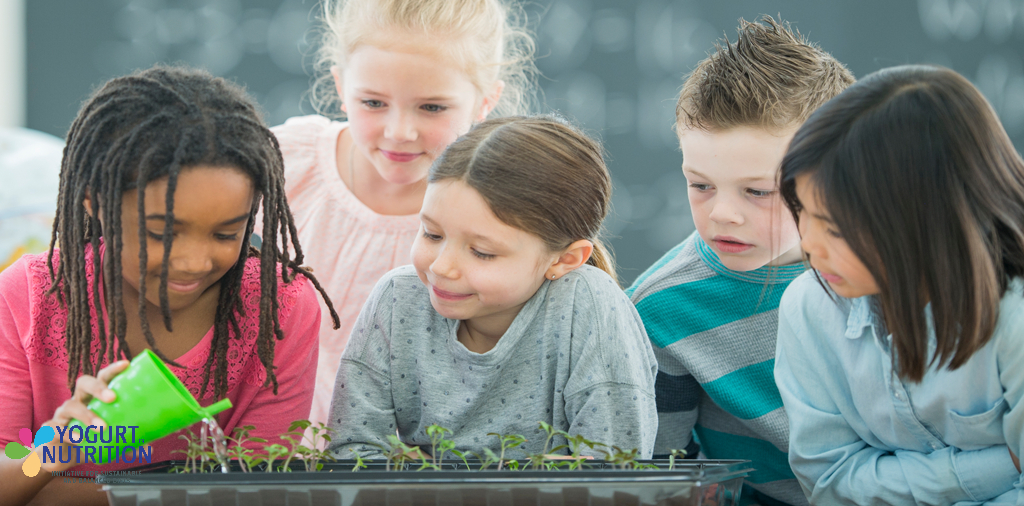The wildfires raging across the world this summer have served as a stark reminder of the need to curb our impact on the planet. High on the list of priorities is to achieve a sustainable food system that is friendly to the environment while providing healthy nutrition and food security for the future – at the same time considering all the social factors tied in with our food supply.
Increasingly, it seems that the younger generation is in the driving seat for change, including bringing about the switch in food choices that we must make as a population.
But how are youngsters learning about these important choices, and what’s the best way to empower them with the knowledge they need? That’s what a group of nutrition scientists set out to explore (1).
Why focus on kids?
The urgent need to adopt sustainable diets is beyond doubt (2). But consumer understanding of what a sustainable healthy diet is remains unclear; raising awareness through education is essential to help people make well-informed choices (3). That’s where teaching children can make a big difference, say researchers.
Timely teaching can help shape children’s lives during the early critical years when their eating habits are still evolving (4). When kids learn about healthy and sustainable eating habits, they also share this knowledge with their families and communities, creating a positive ripple effect (5).
Recognising that children can be powerful agents for change, researchers from the International Hellenic University in Greece carried out a review of studies to see how we’re teaching our kids about sustainable healthy diets, and to identify any gaps and opportunities for future interventions.
The researchers scoured through scientific databases and found 13 studies of activities aimed at teaching children about sustainable diets. These included activities in over 50 schools involving nearly 5,000 children aged 3 to 18 years, with primary school-aged children being most represented across the studies. Most studies were in Europe, with others in the USA, Asia, and Australia.
‘Current sustainable healthy diet interventions targeting primary school-aged children vary in the type of activities, the sustainability content covered and the assessment method applied to evaluate their impact.’ – Patra E, 2023
The good and the bad of teaching about sustainable healthy eating
The good news revealed by the review is that children all around the world are being taught about sustainable healthy eating, with a variety of fun and creative approaches being taken. The not-so-good news is that it’s difficult to compare the success of these activities due to the varying design of the studies.
Most of the activities fell into one of three categories:
Classroom sessions
- Activities aimed to raise awareness on the topic of nutrition and/or sustainable diets
- lessons for the students
- Teacher training sessions
Fun activities
- Creative activities for kids, such as school gardening, poster making,
- Field trip and visits to local farms,
- Interactive plays
Dietary changes
- Changes to school meals so that they are more sustainable, vegetarian-only meal options, and locally sustainable school lunches following nutritionist advice
The activities focus mainly on food waste – essential for cutting down on wasted resources in producing food – and diet quality for balanced and nutritious diets. However, little attention is given to social and economic factors, also key parts of a sustainable diet.
Consistency is key to successful learning about sustainable healthy eating
The review found that the studies have used a variety of ways to assess the impact of each educational activity. They’ve tended to have different indicators of a sustainable healthy diet and different ways of measuring them, making it tricky to compare results across studies.
Highlighting the need for consistency in the definitions and measurements of such learning activities, the researchers call on policymakers to make standardising indicators of a sustainable healthy diet a top priority, reflecting all aspects of sustainable food systems. It’s essential to align efforts, so we can truly understand the impact of our interventions, the researchers stress.
‘Future interventions that include primary school-aged children should address a greater scope of sustainable healthy diet indicators and their respective dimensions.’ – Patra E, 2023
What is a sustainable healthy diet?
You might be wondering, what exactly are sustainable healthy diets. Well, they’re about more than just eating your vegetables. Sustainable healthy diets take into account the bigger picture of how our food choices affect the environment, the economy, our society, and our health and well-being (1):
- Environment: Low environmental impact, preserving biodiversity and natural resources
- Economy: Affordable and accessible for all
- Society: Culturally acceptable and suited to local food habits
- Health & well-being: Composed of foods meeting energy and nutrition needs
Think of it as a win-win situation where we eat in a way that’s not only good for us but also for the planet.



